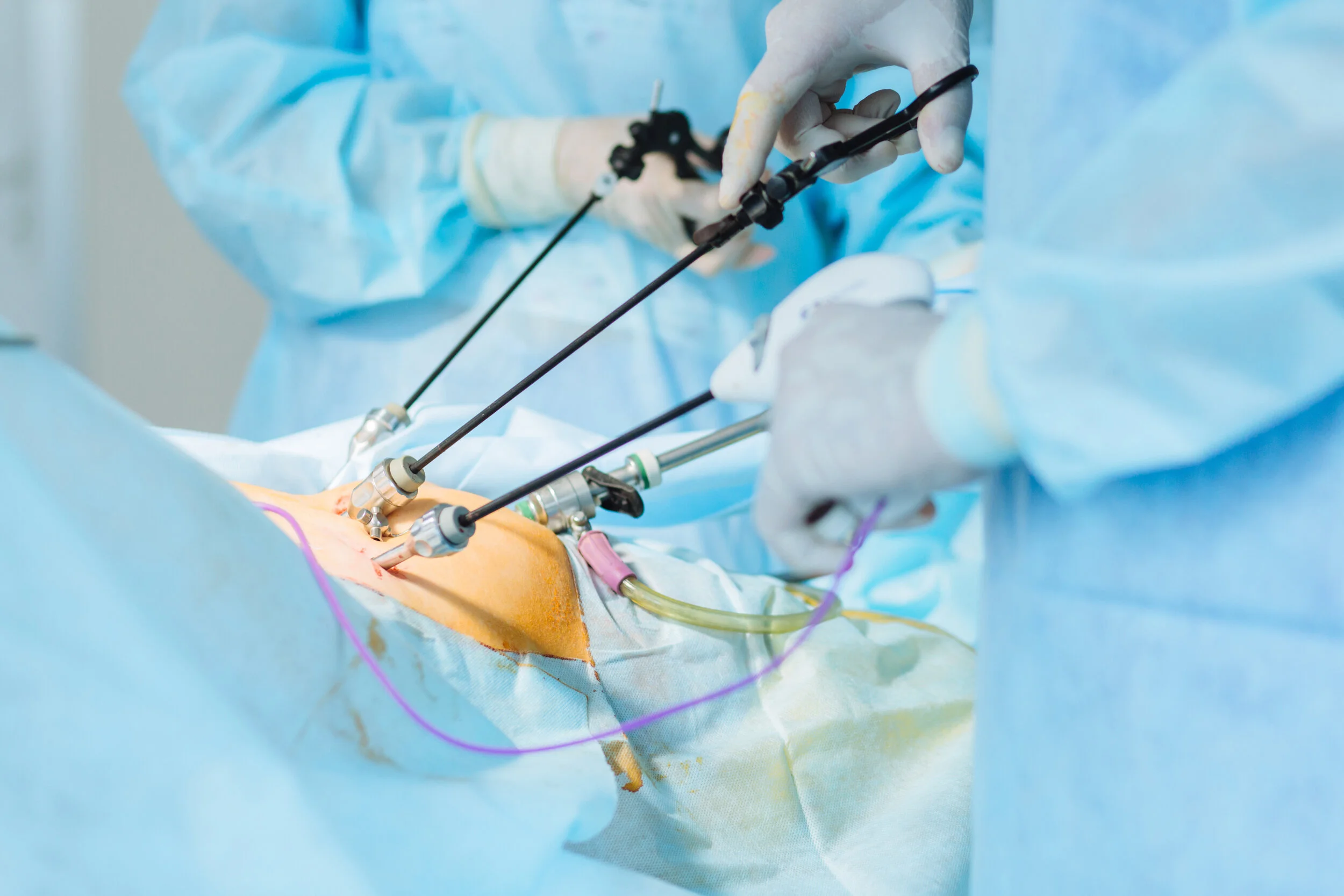Ventral Rectopexy
A Ventral Rectopexy is an operation used to treat prolapse of the rectum. Most commonly a full thickness external prolapse (where the rectum protrudes outside) is the indication but occasionally the operation is used to treat internal prolapse (intussusception) or prolapse into the back of the vagina (a rectocoele).
Material is used to tether the front wall of the rectum to the top of the sacrum (tail bone). This tethering prevents the rectum from prolapsing.
How will my surgery be performed?
Almost all ventral rectopexy operations are able to be completed using laparoscopic or robotic (keyhole) techniques.
Keyhole surgery
Keyhole or laparoscopic surgery is where several small incisions are made in the abdomen. The abdomen is then inflated with gas (carbon dioxide) to create a space to work in. Long instruments with fine tools on the end are then used to perform the operation
The benefit of keyhole surgery is usually a faster recovery and less post-operative pain.
Robotic Surgery
In some cases robotic surgery may be advantageous. This is similar to conventional laparoscopic surgery but the instruments inserted through the keyhole incisions are robotic, controlled by the surgeon via a console. Robotic surgery is not suitable for every case.
Open surgery
Open surgery was the traditional way to perform bowel operations. It is likely only to be needed in very difficult or challenging cases.
Do I need to take bowel preparation before surgery?
Most likely not! The hospital will administer an enema on the morning you arrive for surgery to empty the rectum to allow the procedure to be performed
What Material will be used?
The material used to suspend the rectum from the sacrum is known as mesh. Mesh comes two major varieties, non-dissolving (synthetic) mesh and dissolving (biological) mesh. Your surgeon will discuss choice of mesh with you.
Isn’t Mesh Dangerous?
Mesh has been used by surgeons for many decades in the repair of hernias. Whilst Mesh does have some unique complications related to its use, the benefits from using mesh far outweigh the risks for most patients.
Recently it has been recognised that the use of mesh to repair vaginal prolapse by gynaecologists has led to unacceptably high rates of complication, and this has generated a lot of media coverage and several large lawsuits.
Mesh used for ventral rectopexy does not carry the same level of risk as mesh used for vaginal prolapse. None of the media coverage and lawsuits have related to mesh used in ventral rectopexy. Please discuss this further with your surgeon if you have any concerns.
What can I expect after my surgery?
This will differ a little bit depending on who the anaesthetist is.
Pain relief
Most people will get local anaesthetic injected around the nerves of the abdominal wall at the time of surgery. This will usually last for several hours. You may have a PCA (Patient Controlled Anaesthesia) to deliver strong pain relief through an IV cannula. You are responsible for pushing a button to deliver the pain relief when you need it. There will also be tablet pain relief available should it be required.
Diet
Most people can eat food the day after surgery. There is plenty of evidence to show that the sooner people start eating, the sooner they recover! If you have nausea after your surgery we will give you medications to manage it and you may need to slow down how much you eat and drink.
Tubes and catheters
You will come out of surgery connected to a few tubes. There will be IV fluids hanging on a pole by the bed connected to an IV cannula. This will usually continue for 1 day until you are drinking enough. There will be a catheter in your bladder measuring output of urine. This will often be removed about day 1 once you are able to get out of bed. You will also be connecting to oxygen through either a mask or “nasal prongs”.
Preventing clots
Deep vein thrombosis is a serious complication of surgery. In order to reduce this risk you will have compression stockings put on your legs prior to surgery. During surgery you will also have calf compressors on. These will normally be taken off within a day or two after surgery once you are able to walk around. You will also receive a low dose blood thinner injection daily to stop clots. The oral contraceptive pill increases the risk of clots. If you are taking it we will usually recommend stopping it prior to surgery.
Medications
After the operation:
· You will continue with your usual medications, possibly except for any blood thinners
· You will be given injections daily to prevent clots in the legs
· You will receive adequate medication for pain relief and nausea
When you go home:
· You continue your normal medications unless instructed otherwise
· You will be given pain relief medication to go home with and take it as needed
· It is likely that you will require laxatives
How long will I be in hospital for?
Your length of stay can be varied. It is typically 48-72 hrs
What will my bowels be like after surgery?
A ventral rectopexy will often improve your ability to empty your bowels, as most patients with a prolapse find going to the bathroom a difficult experience. It is VERY IMPORTANT that you do not become constipated after the surgery, as straining to pass stool may damage the repair before it has time to heal in place. Your surgeon will likely prescribe you laxatives to prevent this
What are the risks of surgery?
Bowel surgery is major surgery and carries risks. Whilst it is not possible to list all potential complications the following are the more important and common ones:
Bleeding
Bleeding can occur from any surgery. If the bleeding is excessive you may require a blood transfusion.
Infection
Infections can happen in the wound or deeper within the abdomen or pelvis. It may just require antibiotics for the milder infections, or further operations for the more severe infections. There is also the risk of chest infections (pneumonia) and bladder infections (UTI).
Ureteric injury
The ureter is a tube that runs from each kidney to the bladder and drains urine. There is a very low risk of damage to the ureter during a ventral rectopexy.
Vaginal or Rectal Injury
In order to fix the mesh to the rectum it is necessary to internally open the space between the rectum and vagina. There is a very small risk of injury to the wall of one or both these organs. This can lead to very serious complications but fortunately it is very rare (<2%)
Hernia
Any incision in the abdomen has the risk of weakening over time and forming a hernia. This would usually not occur until at least a year after surgery. You may need surgery to repair it. Rarely does it happen soon after surgery.
Vascular event
Any surgery has the risk of either a heart attack or stroke.
Further surgery
Any complication may require further surgery to correct the problem.
Death
No one likes to talk about this, but any surgery carries a risk of serious complications and death. Factors that can increase the risk are age and pre-existing medical conditions.

